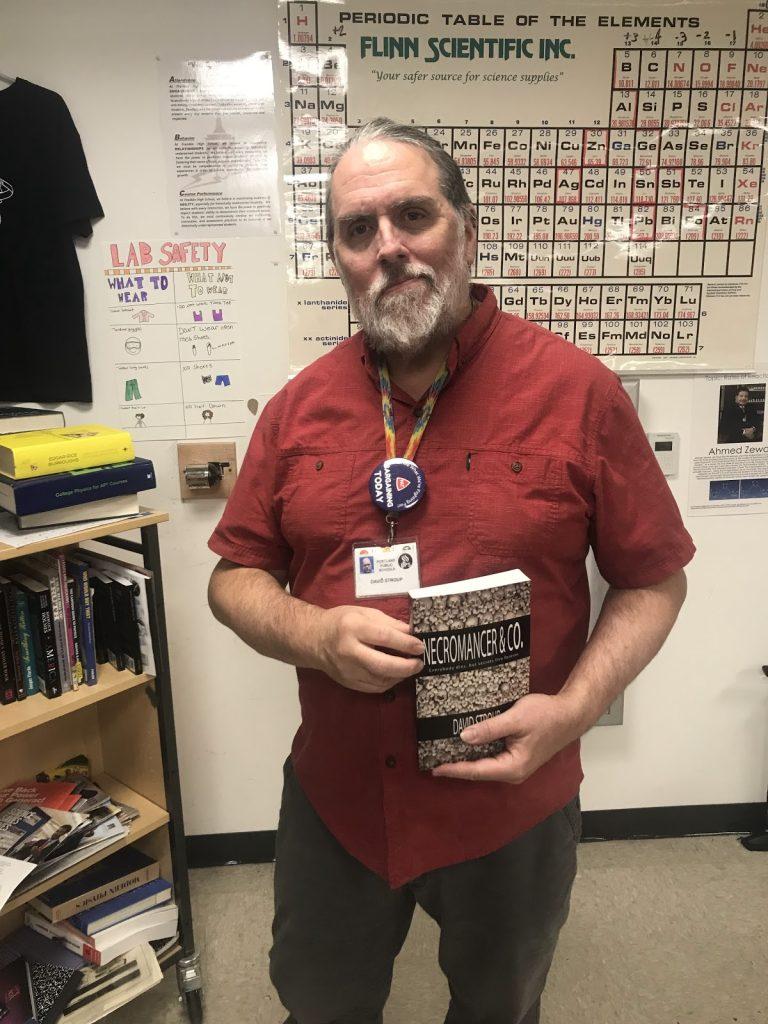
David Stroup is many things: physicist, reporter, radio talk show host, cartoonist, novelist, and teacher. Stroup, who is currently teaching chemistry and Advanced Placement Physics at Franklin High School, grew up on the windward side of Oahu in Hawaii. He attended public high school, where he joined student government and the newspaper, developing an interest in writing. After graduating, Stroup enrolled at the University of Hawai’i-Manoa and received his bachelor’s degree in Physics. All the while, Stroup was writing for his college newspaper, explaining: “It took me six years to get my four-year degree. Back then you could do that. I finished the physics degree, got a few journalism credits on the side.”
Stroup was interested in the journalistic side of science, and, right after graduation, he joined an independent radio station called KHVH News Radio, 990 AM. Stroup thoroughly enjoyed his time with KHVH. “The newsroom there had a fair amount of say over what to cover. The owner was often right there in the building, and if he got a press release and he wanted us to cover it, he would come running into the room red-faced, waving,” he says, adding, “We pretty much set the news agenda [in the newsroom].”
However, according to Stroup, after a series of poor business decisions by the owner (whom Stroup described as a talented writer and great employer), Stroup plugged into the public sector, joining Hawaii Public Radio at KHPR. He was hired specifically as an arts reporter, doing stories and profiles on local artists and media. After putting in the hours as the guy that hands in the stories, Stroup got his own radio talk show where he interviewed guests and reported on local news. His show was titled “Talk of the Islands.” Some of his guests included the renowned dancer and choreographer Mikhail Baryshnikov, animal behaviorist Temple Grandin, and film critic/author Roger Ebert.
Stroup recounts a memory from his time at KHPR, stating, “When I was hired, the big story was the conflict over the Honolulu Symphony Orchestra,” which, as Stroup remembers, was extremely important to a lot of people. “They were in a labor dispute,” Stroup recalls, “the musicians were prepared to strike for more money, and they did because the owners insisted they couldn’t pay them anymore.” Eventually, “the owners hired a bunch of scab musicians to replace them, and the musicians who were striking created their own symphony.” Stroup finishes, “[at some point] the owners of the Honolulu Symphony Orchestra realized it wasn’t that easy to replace the musicians, and the musicians realized it wasn’t that easy to make money running your own symphony orchestra, and in the end they patched it up.”
Stroup says “I got the chance to interview a lot of interesting people— politicians, [artists].” When asked what his favorite interview he conducted was, he answered excitedly by describing a man named Makia Malo: “He was a blind storyteller from the leper colony on Molokai,” a colony ravaged by the disease, “cured long ago, but they still bore the scars. [Malo] told fascinating stories.”
Stroup also interviewed Micky Dolenz, the drummer and one of the lead vocalists of the 60s rock band “The Monkees.” According to Stroup, “[Micky Dolenz] said that becoming famous was like if Leonard Nimoy had become a real astronaut.”
Stroup also has five different published novels: a three-book series, titled “The Engines of Dusk,” and two stand-alone titles, “Everybody Dies, But Some Secrets Live Forever: Necromancer & Co.,” and “The Case of The Electric Resurrectionist.” The two latter books are part of the same fictional universe where a Sherlock Holmes-inspired necromancer detective solves crimes in a steampunk-style mid-century city. Stroup has had many literary influences, including “Fear and Loathing in Las Vegas,” “Dune,” J. R. R. Tolkien (Stroup is currently a member of The Tolkien Society), and, as Stroup says, “I’m enough of a Star Trek fan to rival Mr. Garcia.”
Stroup has covered a wide variety of topics and has had many interviews over the course of his journalism career. His deep understanding and love for journalism as a field is clear. However, there are some stories that are difficult to get through. Stroup details “one, just for a local paper, a smaller story. Interviewing a mom and her daughter. I talked with the mom separately.” Stroup goes on to say, “The daughter was dying. She had a terminal condition. The mother was specifically hoping to get a profile in the local paper to raise money to help the little girl. This is just a thing you do sometimes; local community journalism.” Stroup paused for a moment, then continued, “While the girl was out of the room, the mother told me [the girl] was dying, but that she doesn’t really know that. So, you know, [the mother] talked in terms of her being sick, and the help she needs to get over it, but she wasn’t going to. This was terminal. [The mother] didn’t want her daughter to know that, so I ended up writing a profile, but I couldn’t really come straight out and say that she was going to die. That was difficult.” Stroup shifts for a moment. “That’s a place where you don’t really gain anything from suddenly becoming a hard-boiled reporter and breaking the story despite the fact the mother doesn’t want it. You just have to have compassion for the family,” he adds.
Stroup is a true polymath: a physicist, a teacher, a journalist interviewing politicians, celebrities, and academics, and a writer. He is someone who creates. Now a passionate educator at Franklin, he is sure to make and do more fascinating things in the future, with another book already on the way.

































